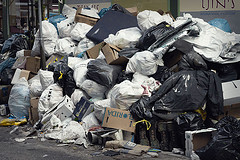Garbage and the Herd Mentality
In our recent podcast “Riding the Herd Mentality,” we discussed how the actions of people around you significantly affects your behavior. A new paper studies garbage and litterers, and whether more garbage begets more garbage. Researchers Robert Dur and Ben Vollaard collected data for three months in a densely populated residential area in Rotterdam for some 4,000 households. The abstract:
Field-experimental studies have shown that people litter more in more littered environments. Inspired by these findings, many cities around the world have adopted policies to quickly remove litter. While such policies may avoid that people follow the bad example of litterers, they may also invite free-riding on public cleaning services. This paper reports the results of a natural field experiment where, in a randomly assigned part of a residential area, the frequency of cleaning was reduced from daily to twice a week during a three-month period. Using high-frequency data on litter at treated and control locations before, during, and after the experiment, we find strong evidence that litter begets litter. However, we also find evidence that some people start to clean up after themselves when public cleaning services are diminished.
They found that in the experimental treatment areas where garbage collection services were reduced, the amount of litter increased by almost 50 percent. However, residents in these areas also considered alternatives to waiting for garbage collection: donating old household items. Dur and Vollaard write: “Overall, our findings suggest that the provision of public cleaning services crowds in private contributions to a clean environment of some people, even in the longer term, but crowds out private contributions of others, with the former effect dominating the latter.”


Comments